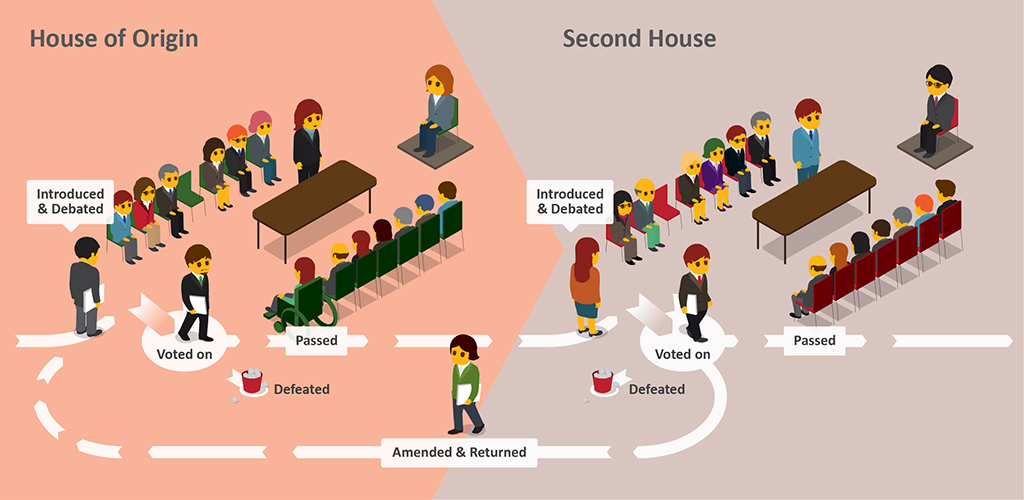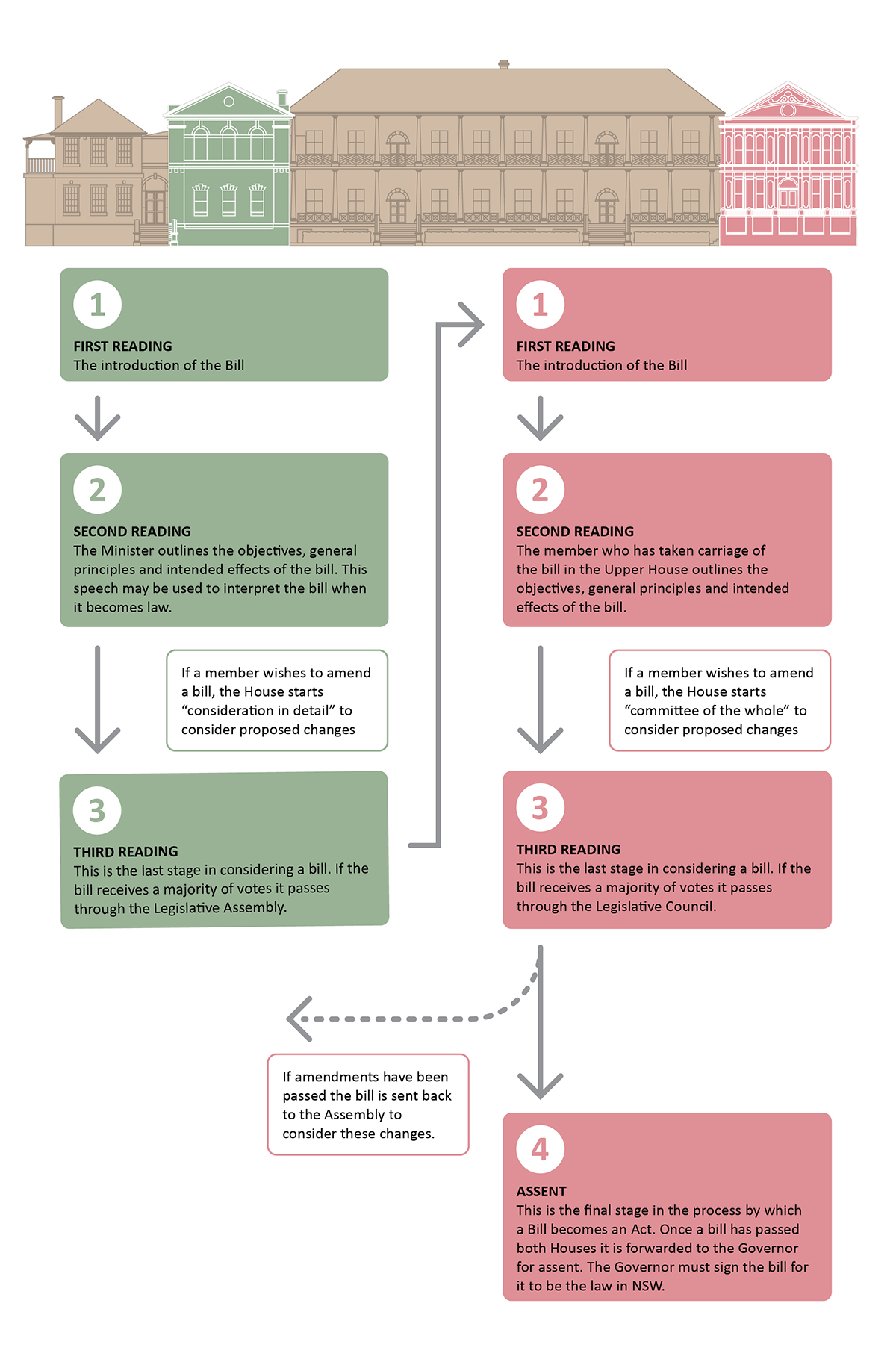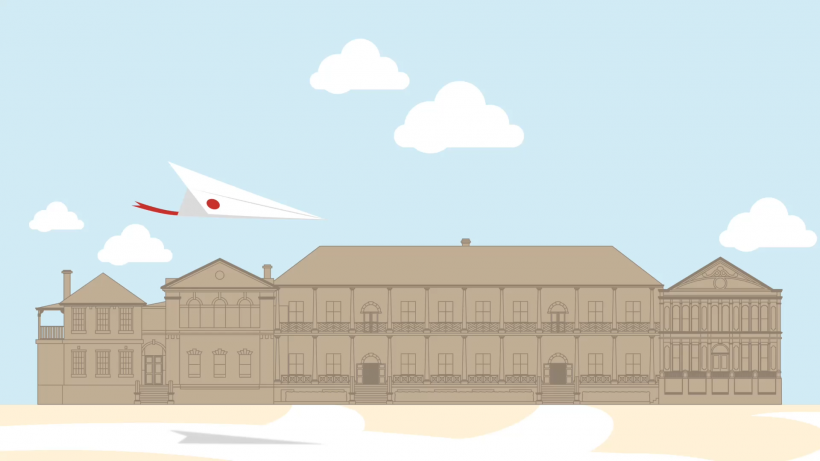Learning Outcomes
- Identify why laws change and the conditions that give rise to these changes
- Describe the legislative process in the making of statute law
- Explain the function and process of making delegated legislation and how it differs to statute law making
Syllabus Links
Syllabus Links
Part I: The legal system
2. Sources of contemporary Australian law
- statute law
- legislative process
What is the Role of Parliament?
The NSW Parliament’s law making power is subject to both the Commonwealth Constitution and the NSW Constitution.
The main functions of the Parliament are:
- Forming government
- Making legislation
- Representation for voters and citizens
- Scrutiny of the Government

Section 5 of the Constitution Act 1902 (NSW) allows the Parliament of New South Wales to make laws for the “peace, welfare and good government” of the State.
Read more about this on the Division of Powers page.
What is Legislation?
Legislation is a document containing rules that have been voted on and approved by the Parliament. A piece of legislation approved by the Parliament is also known as an Act or statute and tells us what the rules are in a given area. Legislation also includes subordinate (or delegated) legislation which are made under Acts of Parliament.
Why Does Law Change?
Laws are always changing and reflect the morals and values of the society we live in. They are made either through the statutory process or common law. Common law is made by the courts and statute law is made by the Parliament.
Existing laws can change because of societal change, they require updating or are no longer relevant.
Ideas for new statute laws can come from many places including:
- Members
- Citizens
- Community groups and organisations
- Government departments
- Business groups
- Political parties
- Parliamentary committees
The difficult task of turning an idea or a policy into the precise language of a law is the work of expert drafters in the office of the NSW Parliamentary Counsel’s Office.
Making Law

Many but not all Acts are initiated by the political party that is in government. When the Government is satisfied that laws are needed, usually the Minister concerned submits the proposal to the Cabinet for approval and a bill is drafted by the expert drafters. The party room is where bills will be discussed with all members of the party.
From Idea to Parliament

A bill can be introduced in either House but must pass both to become a law.
If the second House wishes to amend a bill passed by the House of origin, it will send the amended legislation back to the House of origin.
If the amendment is agreed to, it then becomes part of the bill – if not messages will pass back and forth between the Houses until there is agreement. Sometimes, it may be presented again later, perhaps in a different form or in another session of Parliament.
Royal Assent

This is the final stage in the process by which a bill becomes an Act. Once it has passed through all stages in both Houses, the Governor must sign it before it can become law. This process is called assent. An Act will come into force 28 days after the Governor’s signature unless the Act specifies otherwise.
Summary of the Passage of a Bill
Before a bill is introduced into Parliament the Minister or private member introducing it gives notice of their intention to introduce the bill. Copies of the bill are distributed and published on the Parliament’s website here.
Bills can be introduced in both Houses. In the below example, we will imagine a bill has been introduced in the Legislative Assembly. Once it has gone through three stages, it is forwarded to the Legislative Council.
The Council will also read the Bill in three stages and may agree to the bill without amendment and forward it to the Governor for assent. However, it may return the bill with amendments for the Assembly’s consideration or it may not pass it.

The above diagram shows the processes a bill will always go through. However, there are many other options available for members to find out more information or question the proposed legislation.
These include:
- Forming committee inquiries to further consider the proposed law
- Calling for Papers
- Question Time
- Accepting Petitions
- Private Members Statements
- Debating motions
- Matters of Public Importance
An example of this process is captured by the Legislative Council’s summary of the passage of the Abortion Law Reform Act in 2019 available here. In this case study the bill was also referred to a committee to investigate issues and hear from a range of stakeholders.
A more detailed fact sheet is also available here.
How is Subordinate or Delegated Legislation Made and How Does it Differ?
Sometimes Acts only outline broad guidelines or principles, leaving details to be defined later in regulations made through a Minister (example – traffic or planning laws). Through the authority of an Act of Parliament, power can be handed over to Ministers or other executive office-holders to make regulations. These regulations are also known as delegated legislation and different types include
- regulations
- by-laws
- ordinances
- orders in council
- various other ‘instruments’ made by the Executive that fill in the detail of a law
The flexibility of delegated legislation is useful in matters that change regularly. However, these benefits may come at the cost of reduced parliamentary scrutiny. In some cases regulation can be disallowed by the Parliament. To learn more about this process we recommend the Legislative Council’s blog on the process. You can also read this Parliamentary Education blog.
Example of reform through delegated legislation
In April 2020, The Minister for Health and Medical Research, made changes to the Public Health Act 2010 through the Public Health (COVID 19 Restrictions on Gathering and Movement) Order 2020 to give citizens new protections and to stop the spread of the virus.
Latest Bills
Check Out the latest Bills and regulations passed in the Parliament here
Can an Existing Law Be Reviewed?
The law can be updated in line with social values and in response to developments in new technologies.
Some bills have a review mechanism built into them that suggests they should be reviewed by a committee or the Minister after a certain period of time. Ministers can also introduce an Amending Bill to update or change an Act and also committees make recommendations to the Government about reform. The Legislation Review Committee plays an important part of our legislative process by examining Bills introduced into parliament to see if they trespass on rights and freedom. You can find more information about the role of parliamentary committees on our page Law Reform and Parliamentary Committees.





